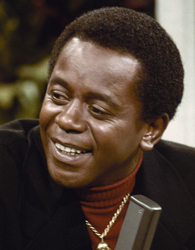Through his ingenious comedy sketches, Flip Wilson and his eponymous variety show connected a racially divided world with laughter. On his birthday, we remember the life and laughs inspired by the comedian who declared, “Funny is an attitude.”
Flip Wilson’s Early Days
Clerow Wilson Jr. was one of several children born to a poor Jersey City, New Jersey, family on December 8, 1933. After placement in foster homes and a short stint in reform school, the 16-year-old enlisted in the Air Force by lying about his age.
Performing stand-up comedy for his fellow servicemen, Wilson found his niche, eventually earning his legendary name, “Flip,” after being told he always seemed “flipped out.” At the age of 21, he was discharged from the service and found work in San Francisco’s Manor Plaza Hotel as a bellhop. As a performer, he parodied ordinary people, and won audiences over with his drunken personality act, working his way from “small blacks-only clubs,” to bigger and better circuits, including the Apollo, the Regal and other famed theaters.
Sources in this Story
- Biography.com: Flip Wilson
- Museum of Broadcast Communication: Flip Wilson
- CSUN Today: Still Smiling: Flip Wilson’s Legacy Lives on Through Scholarship Program
- YouTube: Ugly Baby
- YouTube: Popular Videos: Flip Wilson
Wilson’s Notable Accomplishments
In a 1965 conversation with Johnny Carson, Red Foxx praised Flip Wilson as the “funniest one around.” After going on “The Tonight Show” with Johnny Carson, Wilson’s popularity grew and he appeared on other top shows, such as “The Ed Sullivan Show.”
“The Flip Wilson Show” debuted in 1970, during a time when television still tiptoed around the touchy issue of race relations. Although legislative triumphs for the civil rights movement had been achieved, few shows existed with black leading characters. To break racial barriers, Wilson provided “stereotype comedy” sketches to remind audiences of their own prejudices.
“The Flip Wilson Show” aired weekly on Thursday nights at 8 p.m. on NBC for four solid years, and featured only Flip Wilson as himself—with no sidekicks—and a star-studded roster of guests, among them John Wayne, Bing Crosby, Johnny Carson, Lucille Ball and Dean Martin.
Viewers tuned in to see his outlandish monologues, skits and the characters he famously portrayed. Some of Flip’s comedic highlights include his encounter with the ugly baby, the flamboyant Reverend Leroy and his Geraldine character, who made famous the phrase, “What you see is what you get.”
According to the Museum of Broadcast Journalism, “His style combined deadpan delivery and dialect borrowed from his role models, Redd Foxx and Bill Cosby, but replaced their humorous puns with storytelling.”
Topped only by “All in the Family,” “The Flip Wilson Show” was the number-two rated program in the nation for the first two years it was on the air.
The Man and his Work
- “The Best of the Flip Wilson Show”
- “The Flip Wilson Show”
- “Zora Is My Name!”
- “The Flip Wilson Show“ by Meghan Sutherland
The Rest of the Story
Wilson won several awards, including a Golden Globe for Best Actor in a Television Series, and the show garnered 18 Emmy Awards in its 1972 and 1973 seasons.
When “The Flip Wilson Show” ended, he made regular appearances on “The Ed Sullivan Show” among others, but his career and name diminished over time after he devoted himself to raising his children.
On November 25, 1998, Flip Wilson died at his home in Malibu, California from complications of liver cancer.
Wilson’s legacy remains in his body of work and the annual scholarship fund he helped create for black students majoring in journalism at five schools: Rutgers University in New Jersey, the University of Washington in Seattle, Wayne State University in Michigan, California State University-Northridge and Howard University in Washington, D.C.
This article was originally written by Jen O’Neill; it was updated December 10, 2017.











